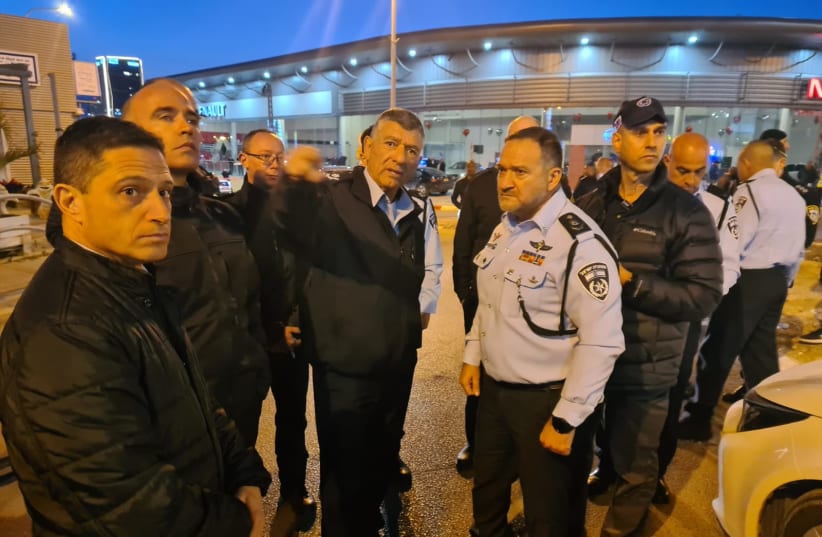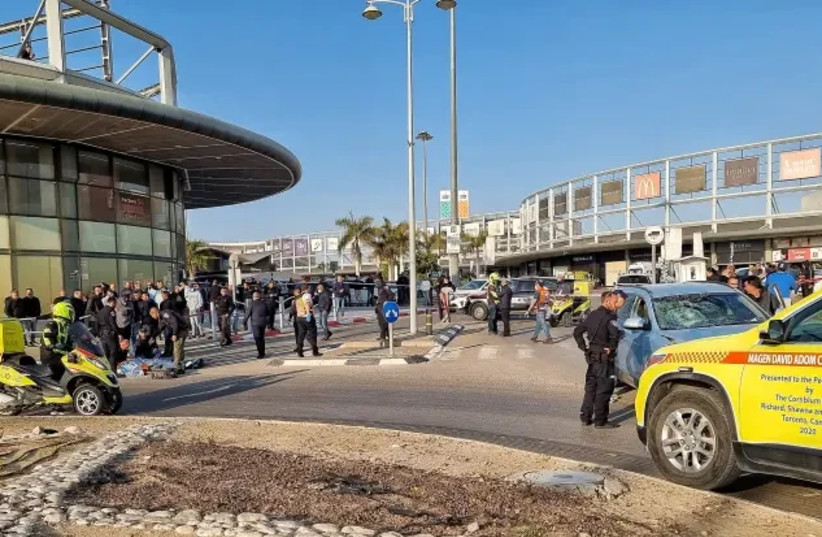Israel Police chief Kobi Shabtai said that a police officer cannot be put on every street corner, after he was criticized for what some saw as a slow police response in the murder attack in Beersheba on Tuesday.
“In light of the deadly terror attack yesterday, Israel Police have raised vigilance and alert levels across the country, and we will not hesitate to act against terrorism wherever necessary,” Shabtai said on Wednesday.
He pointed out that it took four minutes for police to arrive at the scene from the moment the attack was reported, and that this is considered a fast response time.
Police said on Tuesday that the attack had continued for four minutes before it was even reported to police, meaning officers only arrived at the scene eight minutes after the attack began.
Shabtai said that while the response time is considered quick, the four minutes it took to arrive were “critical and important.”
“Unfortunately, the operational reality of Israel Police does not allow the placement of a police officer on every street corner, or at every entrance of a store or shopping center,” the police chief said. “Our deployment varies according to threats and warnings, according to the never-ending missions, and according to the public needs that are growing in parallel with the expansion of cities and towns.”
Shabtai lamented that the police department “is small in the face of growing tasks,” and that “we have been shouting this for over a year in the hope that more resources and manpower will be available to us in the near future.”
He said that he had spoken with Elior Swisa, the police officer whose sister, Lora Yitzhak, was killed in the attack, and that the police would help him in any way possible.
“Elior’s story illustrates to us more than anything the reality of Israeli society, a reality of maintaining security alongside strengthening family values,” Shabtai said. “A reality of service and sacrifice for the state alongside bereavement and unbearable loss. Elior did not imagine that an incident to which he was called would shake his world and turn him into a bereaved brother.”
Shabtai also addressed the guns being taken away from the civilians who shot the terrorist, which led an argument that ended with police threatening to arrest one of the civilians. Shabtai said the police would examine the incident in order to establish a quick and more sensitive and effective procedure in these kinds of situations.
“An event as we experienced yesterday must be the one that reminds us how important brotherhood and social solidarity are,” said Shabtai. “We must not give terrorism what it wants, we must not give it the ability to intimidate us, divide us and attack each other. Israel Police will continue to act with endless determination in the face of anyone who seeks to harm and harm Israeli citizens.”
Four Israelis – Doris Yahbas, Moshe Kravitsky, Lora Yitzhak and Menachem Yehezkel – were murdered on Tuesday in a terrorist stabbing attack at a shopping center and gas station in Beersheba, with two others injured and still hospitalized at Soroka Medical Center.
President Isaac Herzog spoke with Arthur Haimov, one of the citizens who shot the terrorist in the attack.
“You acted with heroism and composure,” Herzog told the 44-year-old Egged bus driver. “I want to salute you and say thank you. I watched you on TV yesterday and I was very proud. I said to myself, ‘this is beautiful Israel,’ you drove carefully and responsibly.”
Haimov, a father of five who immigrated to Israel at age 13 from Uzbekistan, thanked Herzog and shared with him how he felt during the attack and the prayers he said afterward.
The terrorist was identified as Muhammad Alab Ahmed abu al-Kiyan, a Bedouin-Israeli from Hura who had served time in Israeli prison for supporting and promoting ISIS to students at the school where he was a teacher.
Two of al-Kiyan's brothers were arrested on Tuesday night on suspicion that they provided him with the knife he used in the attack.
Members of al-Kiyan's family and leaders in Hura and other Bedouin communities have condemned the attack, saying it does not reflect them.

